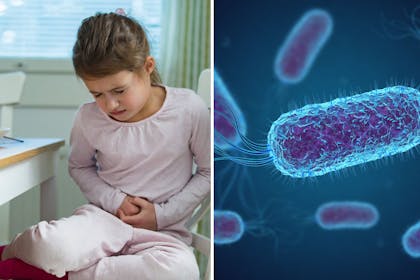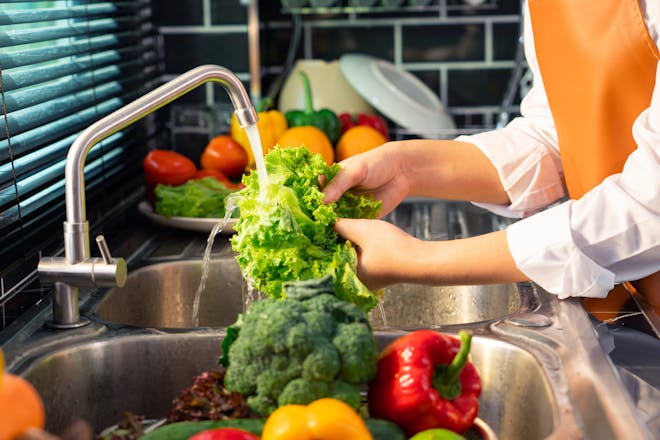Warning for parents as E.coli cases soar – and how to avoid it

A deadly outbreak of cases of E.coli has led health experts to issue a warning to parents after the death of a child
Parents are being warned after a rise in the number of E.coli cases in children.
The extremely rare sickness bug has left 25 people ill and 1 dead since the end of May – and most of them are children.
The rare strain of the E.coli bug – of which there had previously only been 15 cases since 2016 – is leaving those infected with diarrhoea and sickness.
The outbreak is caused by shiga toxin-producing E. coli (STEC) O183 — a strain that causes gastroenteritis.
So far, 6 people have been hospitalised, while 1 has died, although it is currently unclear whether the person died because of STEC or with it.
Now parents are being urged to wash their fruit and veg to help stop the spread of the contagious disease.
- Check if you're eligible for £200 school uniform grant
- Low-income families offered £250 free cash
- Is the Temu app too good to be true? See our £45 haul
- All the Universal Credit rates for parents after rule changes
'Most cases seen in children'
The stark warning comes after popular family adventure Hobbledown, in Epsom, Surrey, was forced to shut at the beginning of the summer holidays after 3 people contracted the infection.
So far the source is unknown, but some of the people have reported to have eaten grated hard cheese, while others have eaten strawberries, cucumbers, peppers and watermelon.
The UK Health Security Agency (UKHSA) is trying to identify what has caused the outbreak.
'The UKHSA has identified an outbreak of a rare form of STEC, with most cases seen in children,' says UKHSA incident director, epidemiologist Amy Douglas.
'The outbreak’s source has not yet been identified, but we are working with partners, including the Food Standards Agency, to investigate,' she added.

How can I avoid contracting E.coli?
E.coli is spread through contaminated food or water, contact with animals or their environment, or from 1 infected person to another.
The best way to avoid contracting it is by making sure you wash your hands when preparing food, and thoroughly washing fruit and vegetables before eating.
You should also keep young children away from others to avoid spreading the bug.
'Children under five shouldn’t attend school/nursery/group childcare until they have been free of sickness or diarrhoea for 2 days,' added Amy Douglas.
The latest outbreak
Health authorities are not sure what is causing this latest outbreak but urge parents to be cautious.
Professor David Gally, chief scientific advisor at Food Standards Scotland and chair of microbial genetics at the University of Edinburgh, explains that most strains are found in ruminants, such as cows, sheep and goats.
He explained that the food or drink would have to be 'of a ruminant source' or contaminated with their faeces, such as crops grown nearby.
'This is why the list of possible sources is quite long and highlights the importance of traceback epidemiology studies to find out what people have eaten or where they have been.
'It can be very difficult to find the link,' he said.
How do I avoid spreading it?
The government website lists the best ways of preventing the spread of E.coli
- Chilling your food below 8°C to stop or significantly slow the growth of bacteria
- Cooking food correctly and always following the guidance on time and temperature – this will kill E. coli
- Avoiding cross-contamination which might pass bacteria from raw foods to ready-to-eat foods via things like reusable shopping bags, knives and chopping boards
- Using food and drink by the use-by date on the label, even if it looks and smells fine.
- Washing your hands thoroughly with soap in running water and drying them completely.
- Ensuring everyone washes their hands after contact with an infected person.
- Always washing hands after going to the toilet or changing babies’ nappies, and before preparing or serving food or eating meals.
- Not sharing towels or nappy changing mats.
- Washing soiled clothing and bed linen separately from other clothes in a washing machine at the highest temperature possible.
- Wiping down the outside of the washing machine with hot water and detergent after any heavily soiled load.
- Cleaning toilet seats, toilet flush handles, basin taps, surfaces and toilet door handles at least daily.
- Disinfection sprays and wipes or alcohol-based wipes may be used on toilet seats and other surfaces, but only after any visible soiling has been removed.
- Thick household bleach is highly effective.
- Dispose of cloths by placing them in a plastic bag, sealing the neck and placing in household waste.
- Deal with any spillage of faeces immediately.
What is E.Coli?
E. coli, which stands for Escherichia coli O157, sometimes called VTEC, is a bacterial infection.
It can cause diarrhoea, stomach cramps and occasionally fever.
How it is caused?
- Eating contaminated food
- Touching infected animals
- Contact with people who have the illness
- Drinking water from inadequately treated water supplies
- Swimming or playing in contaminated water.
What are the symptoms?
Symptoms include diarrhoea, stomach cramps and, occasionally, fever. About half of people with the infection will have bloody diarrhoea (contact your GP or call 111 if you or your child has this symptom).
Symptoms can usually be noticed three to four days after being infected, but can start as early as one day after, and last for up to two weeks. Some may not develop any obvious symptoms at all.
Getting treated
There is no specific treatment for E. coli O157 infection. People who are infected can usually be cared for at home and most will get better without medical treatment.
They are advised to drink plenty of fluids to stay hydrated.
Related stories





